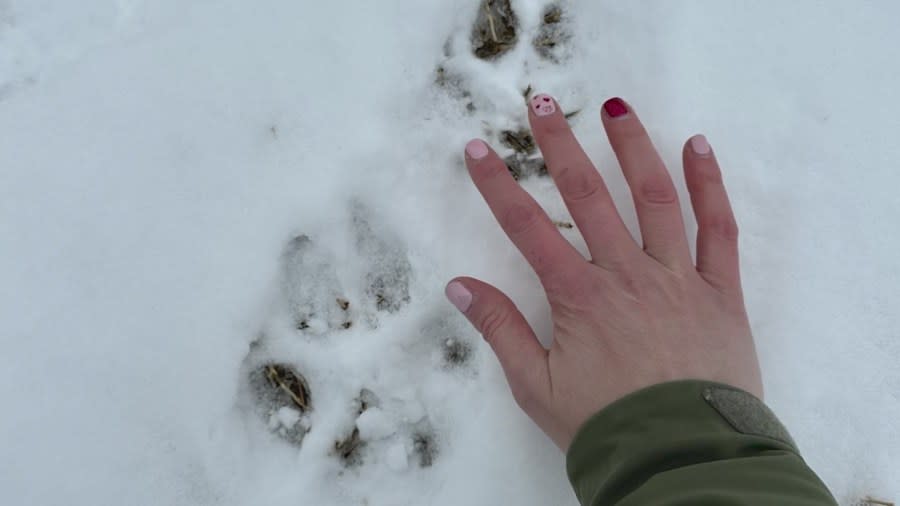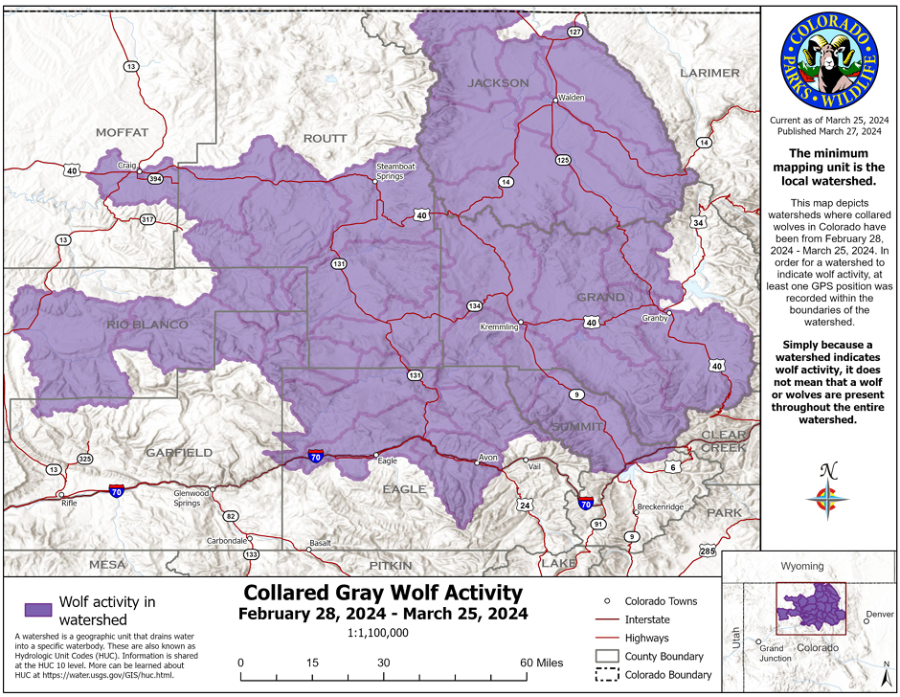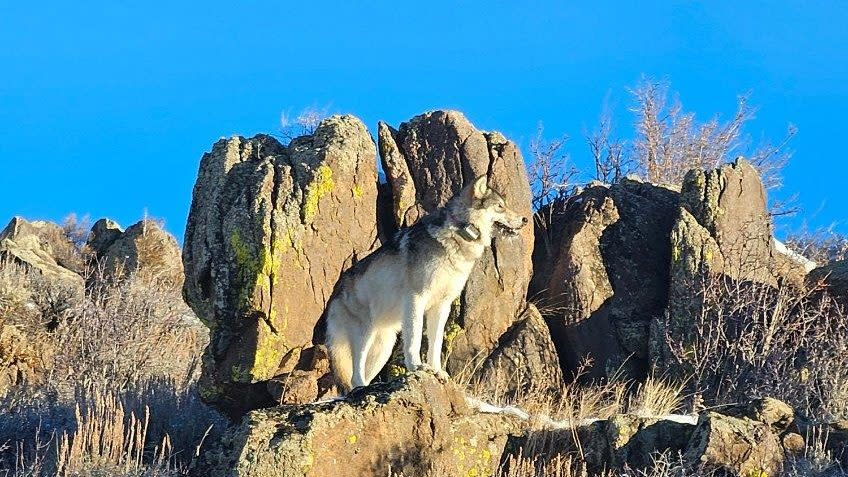Ranching groups, sheriff call on Colorado to kill 2 wolves behind depredations
DENVER (KDVR) — The Grand County sheriff joined ranchers and stock growers of Grand, Jackson and Larimer counties in calling on Gov. Jared Polis and Colorado Parks and Wildlife to remove wolves behind recent cattle killings.
The groups are concerned that the 10 new wolves reintroduced under a voter-approved mandate are a threat to their livelihoods after a string of five Grand County depredations. Depredation refers to an act of preying upon or robbery from someone — in this case, the wolves stealing cattle from ranchers. CPW also confirmed a calf was killed in Jackson County this month.
Photos: Yearling mountain lions rescued from Vallecito Reservoir spillway
The stock growers are pointing to various information included in the Colorado Wolf Restoration and Management Plan that says wolves with a history of chronic depredation should not be translocated and also should not be sourced from areas with chronic depredations.
“Constant and chronic depredation of animals ranging from cows and calves to sheep and even family dogs has been ongoing for over two years at this point and CPW has made no measurable effort to support ranchers or manage conflict wolves,” the Larimer County Stock Growers Association said in its letter to the Colorado Wildlife Commission.
Sheriff calls depredations a matter of ‘public safety’
Lethal deterrents are illegal. According to CPW’s website, a depredation must be confirmed before CPW will allow a rancher to take lethal action against a wolf.
Grand County Sheriff Brett Schroetlin also wrote to the state asking for relief.
“It is my duty as the County Sheriff to prioritize Public Safety and to address a safety lapse when I feel that we are falling short,” he wrote. “In this case, we have a clear Public Safety concern, coupled with increased concerns over private property rights and it is our obligation as leaders to do the right thing, even when the right thing isn’t always the easiest solution.”
Download the FOX31 App: Breaking news alerts & Pinpoint Weather
Schroetlin requested that CPW or U.S. Fish and Wildlife Service “lethally remove” the two wolves allegedly killing the five calves in Grand County.
“Without this immediate action, you are ultimately failing the great citizens of this county; many of whom are multi-generational ranching families and businesses, and setting poor precedence for further encounters in Grand County and most likely other areas in our region that will soon be following suit,” Schroetlin said.
Stock grower groups speak out
The association claimed that there are eight counties where collared wolves have been recorded on CPW’s watershed map. The group also alleged that seven of those counties were opposed to the state ballot measure on wolf reintroduction by margins of 53% to 88%.
The association also stated that these counties have over 130,000 head of cattle or 5% of the state’s total livestock population. The group said these counties’ livestock production provides over $158 million in economic impact to the state.
Wolf tracks spotted in Moffat County in February 2024 This map shows collared gray wolf activity recorded by CPW from Feb. 28 to March 25, 2024. (Courtesy Colorado Parks and Wildlife) A gray wolf spotted in Grand County shortly after it was relocated from Oregon as part of a reintroduction plan.
On the other hand, the association said the total cattle numbers for the 13 counties that voted in favor of wolf reintroduction are about 141,000, or 5.4% of the state’s livestock population.
“It seems only natural that communication would be of utmost importance to the communities who are the most adversely affected,” the Larimer County Stock Growers said. “Yet the opposite is becoming truer with each passing day. CPW has the technology to track reintroduced wolves in real time and, rather than give proactive information to ranchers and residents alike in direct vicinity of collared wolves, you are choosing to release vague locations days and weeks after the fact. This is leading to increased wolf-livestock conflict and further alienating those that should be your partners in conservation.”
The Middle Park Stockgrowers also sent a letter to the state, noting that Grand County producers have “diligently” implemented a “comprehensive suite of non-lethal deterrents,” which include fox lights, maintaining a presence near cattle throughout the night, implementing carcass management strategies and utilizing cracker shells.
Jeff Davis, director of CPW, responded with a letter to the Middle Park group on Tuesday where he discussed quantitative metrics to define chronic depredations. Colorado does not use those metrics to determine if a wolf should be lethally removed. Davis also said CPW staff have begun working with landowners to do night patrols and deploy other conflict minimization tools to the area, which has stopped the depredations at this point.
“I know that you will not be satisfied with the determination to not lethally remove wolves at this time, and I hope that you understand that we are working to implement the state’s Wolf Restoration and Management Plan and to implement state statute, while also working diligently to address the conflicts that livestock producers experience,” Davis wrote. “It has proven to be a tremendously difficult and challenging task for all involved.”
Read CPW’s full response to Colorado stock growers here
Davis also noted that the stockgrower associations’ letter implies unreported, suspected depredation events. He asked members to contact a CPW officer so an investigation can be done.
The director also discussed concerns that the reintroduced wolves could be from chronically depredating packs. He said the wolves may have come from packs that were historically chronically depredating packs, but management action was taken in Oregon before the translocation to Colorado, and the packs were not implicated in depredation.
“To continue to state that we brought known problem wolves into the state is a falsehood. Where wolves and livestock share the landscape, there will be conflict,” Davis wrote. “We will hold tight to the recommendations of the (technical working group) and what is stated in our plan that we will not bring currently chronically depredating wolves into the state.”
Colorado governor’s office responds
In a statement sent late Monday night, a spokesperson from Colorado Gov. Jared Polis’ office said lethal control of wolves when only 12 are in the state is “premature.”
“It is widely known that wolves are opportunistic hunters and Colorado voters were fully aware of the diet of wolves and made the decision to reintroduce wolves. Now CPW and CDA will work with ranchers on how to successfully and non-lethally deter predation, as is being done successfully in many other states that have both vibrant and successful ranching sectors and a much larger population of wolves than Colorado,” the spokesperson said.
The state reimburses confirmed wolf-caused depredations on cattle, up to $15,000 per loss. The spokesperson added that the state has established a dedicated Wolf Depredation Compensation cash fund of $175,000, provided from the state’s general fund. The compensation fund will receive an additional $350,000 per fiscal year to keep a healthy balance in the fund on an ongoing basis.
FOX31 Newsletters: Sign up to get breaking news sent to your inbox
CPW has spending authority for up to $175,000 in the current fiscal year from this fund to compensate livestock owners for wolf depredation. CPW also requested increased ongoing spending authority of up to $525,000 per year beginning in the next fiscal year, which is currently being considered by the General Assembly as part of the so-called “long bill” that appropriates annual spending, which will be signed into law.
“The Colorado Department of Agriculture and CPW continue to work with the Middle Park Stockgrowers and the Grand County community on a plan that would help employ non-lethal deterrent tactics, such as range riders,” the governor’s office spokesperson said. “While the department’s budget request to the legislature for scaling up range riders is pending at the legislature and will likely be signed next week, CDA and CPW are deploying available resources to provide immediate support and are working on a plan to deploy on-the-ground assistance through range riders this month.”
The state has plans to introduce more wolves between December and March 2025, intending to release 30-50 wolves in the next five years.
For the latest news, weather, sports, and streaming video, head to FOX31 Denver.


